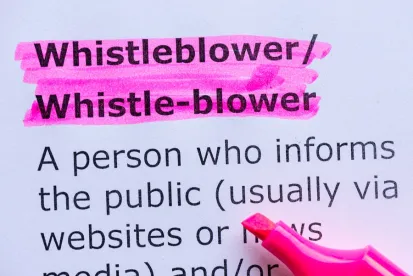On May 12, 2020, Steven Peikin, Co-Director of the Securities and Exchange Commission’s (“SEC”) Division of Enforcement, delivered the virtual keynote address at the Securities Enforcement Forum West. His remarks focused on the Division of Enforcement’s efforts in the last few months to identify, investigate, and remedy COVID-19-related securities fraud. Mr. Peikin described the “significant time and resources on responding to COVID-related matters” the Division of Enforcement has employed and the important role that whistleblowers, through the SEC’s whistleblower program, have played thus far.
Mr. Peikin began by explaining the creation of the SEC’s Coronavirus Steering Committee (“Steering Committee”) in late March. The Steering Committee is comprised of two dozen leaders from the Division of Enforcement and is leading the SEC’s fight against COVID-related fraud with a mandate to “proactively identify and monitor areas of potential misconduct, ensure appropriate allocation of resources, avoid duplication of efforts, coordinate responses as appropriate with other state and federal agencies, and ensure consistency in the manner in which the women and men of the Division address coronavirus-related manners.” According to Mr. Peikin, the Steering Committee has identified and focused on “key areas of potential market and investor risk,” which provide unlimited opportunities for fraudulent actions during the current crisis.
The first of these areas is “microcap fraud” through which low-priced stocks are offered by companies that are making fraudulent and false claims of being able to provide “treatments, disaster-response capabilities, and the like.” These companies are playing on the fear and insecurity of the public by making allegedly false public claims about their ability to provide effective COVID-19 relief to fraudulently induce investors to pump money into their companies.
Next, the Steering Committee is focused on the heightened opportunity for insider trading and market manipulation, which results from the market’s current volatility and the “regular stream of potentially market-moving announcements by issuers.” Because the markets are so easily swayed during the current crisis, and the amount of confidential information that can heavily influence the markets is skyrocketing, the threat of somebody illegally using COVID-19-related confidential information for personal gain through insider trading is enormous.
The Steering Committee is also closely scrutinizing SEC-required public disclosures from companies. It is looking for evidence that companies are either not sufficiently disclosing the effects of coronavirus on their business or are attempting to fraudulently coverup “previously undisclosed problems or weaknesses as coronavirus-related.” The SEC is scrutinizing public disclosures in hard-hit industries to potentially identify any outliers which may indicate a fraudulent omission. While “far from exhaustive list,” these key areas of potential fraud, and the steps the SEC is taking to combat them, provides “a sense of [the SEC’s] overall framework and approach” to COVID-19-fraud according to Mr. Peikin.
Mr. Peikin next spoke on the actual enforcement steps taken to put an end to fraud. Mr. Peikin said that “since February 7, the Commission has suspended trading in the securities of more than 30 issuers as a result of questions about the adequacy and accuracy of coronavirus-related information.” The suspension of trading resulted from a “broad range of claims by issuers, including those relating to access to testing materials, developments of treatments or vaccines, and access to personal protective equipment” and the path to suspension of trading often began with, among other sources, “tips from investors.” By suspending the trading of certain stocks, the SEC can conduct a more thorough investigation into whether actual fraud occurred.
The “potential severity of the impact of this sort of misconduct on investors,” has the SEC “conducting these investigations on an extremely accelerated basis.” As an example, Mr. Peikin described a case involving Praxsyn Corporation. On March 25, the SEC suspended trading in Praxsyn stock “due to questions regarding the accuracy and adequacy of claims Praxsyn made in a pair of press releases ‘about having, and being able to obtain, large quantities of N95 masks used to protect wearers from COVID-19.’” The investigation rapidly continued after the suspension of trading. Just over a month later, on April 28, the SEC filed a civil lawsuit against Praxsyn and its CEO in federal court for making false statements. The entire investigation, from the first allegedly fraudulent claim by Praxsyn, until the filing of the lawsuit, took only 61 days.
Mr. Peikin concluded his remarks by highlighting the importance of the SEC’s Whistleblower Program in uncovering all securities fraud, COVID-related or not, and providing an update on the recent operations of the SEC’s Office of the Whistleblower. Mr. Peikin revealed that since “mid-March, the [SEC] has triaged more than 4,000 Tips, Complaints, and Referrals” from whistleblowers, “a 35% increase over the same period last year.” In that same period, the SEC “has opened hundreds of new investigations, many COVID-19 related, but many in traditional areas.” Finally, the SEC Office of the Whistleblower is still issuing awards to whistleblowers who previously initiated, or provided substantial assistance, to successful investigations and enforcement actions. As explained by Mr. Peikin, “since March 23, the [SEC] has issued awards to nine whistleblowers, including an award of over $27 million.”
If you believe that you have information regarding securities fraud, COVID-19 related or otherwise, seek out a qui tam attorney to consult with you. As explained by Mr. Peikin, during this time, everyone must be on the lookout for COVID-19-related securities fraud. Some examples to look for are publicly-traded companies making false claims about COVID-19 treatments or protective equipment, insider trading based on confidential COVID-19 related information, or the lack of disclosures, or false disclosures, by public companies involving COVID-19. If you have such information, the SEC whistleblower program allows for anonymous and confidential submissions, which could lead to awards of 10-30% of sanctions obtained by the United States.




 />i
/>i

